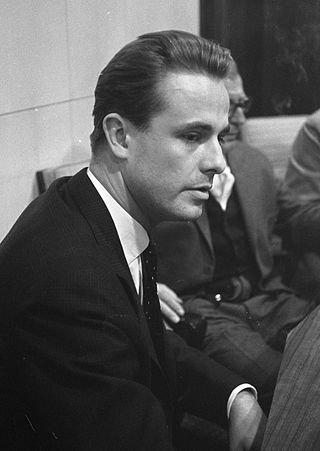
Joachim Hansen was a German actor. He was best known for film roles in the 1960s and 1970s in which he often portrayed Nazi officers and World War II German officials.

The Flying Classroom is a 1973 West German comedy film directed by Werner Jacobs and starring Joachim Fuchsberger, Heinz Reincke and Diana Körner. Two classes in a school have a running feud. It is based on The Flying Classroom, a novel by Erich Kästner.

Tired Theodore is a 1957 West German comedy film directed by Géza von Cziffra and starring Heinz Erhardt, Renate Ewert and Peter Weck. It was shot at the Göttingen Studios. The film's sets were designed by the art directors Dieter Bartels and Paul Markwitz.
We Cellar Children is a 1960 West German film directed by Hans-Joachim Wiedermann.

Tante Trude aus Buxtehude is a 1971 West German comedy film directed by Franz Josef Gottlieb and starring Rudi Carrell, Ilja Richter and Theo Lingen. It was one of several German films in the wake of the 1959 film Some Like It Hot that used cross-dressing as a comic theme.

Shadows Over St. Pauli is a 1938 German drama film directed by Fritz Kirchhoff and starring Marieluise Claudius, Gustav Knuth and Hellmuth Bergmann. It was filmed and shot in Hamburg, and the title refers to the St. Pauli district of the city.
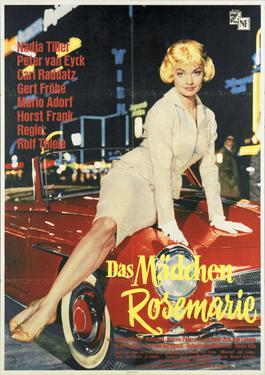
Rosemary is a 1958 West German drama film directed by Rolf Thiele and starring Nadja Tiller, Peter van Eyck, and Carl Raddatz. The film portrays the scandal that surrounded Rosemarie Nitribitt. Thiele made a second film about Nitribitt, Rosemary's Daughter, which was released in 1976.
Rosemary's Daughter is a 1976 West German sex comedy film directed by Rolf Thiele and starring Lillian Müller, Béla Ernyey, and Werner Pochath. It is based on the story of Rosemarie Nitribitt, which Thiele had already treated more seriously in the 1958 drama Rosemary.

Angels of the Street or The Angel of St. Pauli is a 1969 West German crime film directed by Jürgen Roland and starring Horst Frank, Herbert Fux and Werner Pochath. It is set in the St. Pauli red light district of the port of Hamburg.
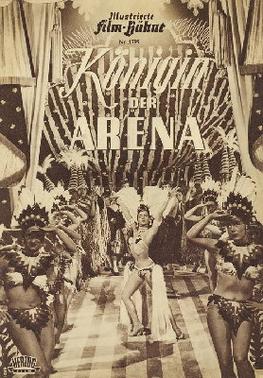
Queen of the Arena is a 1952 West German musical drama film directed by Rolf Meyer and starring Maria Litto, Hans Söhnker and Jan Hendriks. It contains elements of both the revue film and the circus film genres. It was shot at the Bendestorf Studios near Hamburg and on location around Sorrento in Italy. The film's sets were designed by the art director Franz Schroedter.
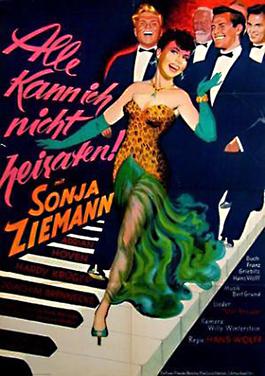
I Can't Marry Them All is a 1952 West German musical comedy film directed by Hans Wolff and starring Sonja Ziemann, Adrian Hoven and Hardy Krüger.

That's No Way to Land a Man is a 1959 West German comedy film directed by Hans Deppe and starring Grethe Weiser, Karin Dor and Karin Baal. It was shot at the Göttingen Studios. The film's sets were designed by the art director Willi Herrmann.
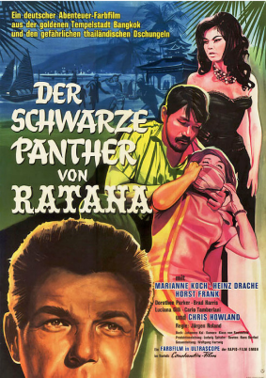
The Black Panther of Ratana is a 1963 West German-Italian adventure film directed by Jürgen Roland and starring Marianne Koch, Heinz Drache, and Horst Frank.

Resurrection is a 1958 historical drama film directed by Rolf Hansen and starring Horst Buchholz, Myriam Bru and Edith Mill. It was made as a co-production between France, Italy and West Germany. It is an adaptation of the 1899 novel Resurrection by Leo Tolstoy.

Between Munich and St. Pauli or The Jolly Detectives is a 1957 West German comedy crime film directed by Hermann Kugelstadt and starring Joe Stöckel, Beppo Brem and Ernst Waldow.

The False Adam is a 1955 West German comedy film directed by Géza von Cziffra and starring Waltraut Haas, Rudolf Platte and Doris Kirchner.

Widower with Five Daughters is a 1957 West German comedy film directed by Erich Engels and starring Heinz Erhardt, Susanne Cramer, and Helmuth Lohner. It was shot at Göttingen Studios, with location shooting at Berlepsch Castle near Witzenhausen. The art directors Dieter Bartels and Paul Markwitz designed the film's sets.
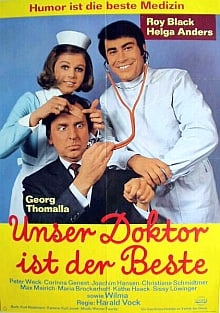
Our Doctor is the Best is a 1969 West German comedy film directed by Harald Vock and starring Roy Black, Helga Anders and Peter Weck.

My Ninety Nine Brides is a 1958 West German romantic comedy film directed by Alfred Vohrer and starring Claus Wilcke, Horst Frank and Wera Frydtberg. It was shot at the Tempelhof Studios in Berlin. The film's sets were designed by the art director Karl Weber.
Holiday Report is a 1971 West German comedy film directed by Ernst Hofbauer and starring Sybil Danning, Astrid Frank and Werner Abrolat. It was produced by Wolf C. Hartwig's Rapid Film, in an attempt to capitalise on the success of the company's hit Schoolgirl Report series.
















